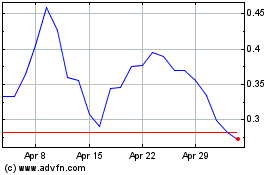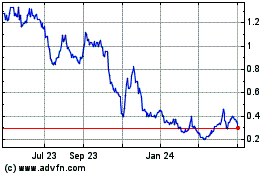New Trial to Evaluate Phenoxodiol as Chemo-Sensitizing Agent in Patients With Chemo-Resistant Ovarian Cancer
April 21 2004 - 9:51AM
PR Newswire (US)
New Trial to Evaluate Phenoxodiol as Chemo-Sensitizing Agent in
Patients With Chemo-Resistant Ovarian Cancer WASHINGTON, April 21
/PRNewswire-FirstCall/ -- Marshall Edwards, Inc., has commenced a
multi-center, multi-national clinical trial that will study the
ability of the investigational anti-cancer drug, phenoxodiol, to
restore the sensitivity of ovarian cancer to the standard
chemotherapies, paclitaxel and cisplatin. The first site to enroll
patients for this study is Yale-New Haven Hospital, New Haven,
Connecticut. The second enrollment site will be announced in June
2004. Laboratory studies have shown that phenoxodiol has the
ability to restore sensitivity to standard chemotherapies in
ovarian cancer cells that have been obtained from women whose
tumors had previously become resistant to those drugs. Subsequent
to a just-completed Phase I/II study, the prelude to this study,
some women with recurrent ovarian cancers that were either
resistant or refractory to standard chemotherapies such as
paclitaxel, showed encouraging evidence of restoration of
sensitivity to paclitaxel following phenoxodiol therapy, despite
the fact that the two drugs were not used in the manner considered
to be ideal in order to achieve reversal of chemo-resistance. The
new study will enroll at Yale 40 patients with recurrent,
late-stage ovarian and primary peritoneal cancers that have become
refractory to taxane- based (paclitaxel, docetaxol, taxotere)
and/or platinum-based (cisplatin, carboplatin) drugs. Refractory
cancers are those that acquire resistance to a particular drug to
the extent that the cancers grow in the face of treatment with that
drug. The two main objectives of the study are to establish the
degree to which phenoxodiol reverses chemo-resistance, and to
compare the relative efficacies of paclitaxel and cisplatin in
combination with phenoxodiol. The treatment regime will comprise an
injection of phenoxodiol on two consecutive days, followed by a
single weekly injection of paclitaxel or cisplatin immediately
following the second phenoxodiol treatment. This will be
administered over a treatment cycle of 6 weeks, with cycles to be
repeated until a response is obtained. Another objective of the
study is to determine the dosage of paclitaxel or cisplatin that
will minimize toxicity when used in combination with phenoxodiol.
The dosage of these two chemotherapies will be reduced as required
until toxicity no greater than Grade 1 is achieved. Grade 1
toxicity is the lowest of 4 levels of toxicity as defined by the
National Cancer Institute's Toxicity Classification Criterion.
Toxicities of Grade 3 or higher are commonly encountered with
dosages of such therapies required to achieve an anti-cancer
effect. Researchers believe that phenoxodiol will restore the
sensitivity of the chemo-resistant cancer cells to the extent that
paclitaxel and cisplatin can achieve a significant anti-cancer
effect with only minimal side-effects. The primary clinical
end-points being sought are a reduction in tumor mass and blood
levels of tumor markers (CA 125 and CA19.9), and an improvement in
clinical status and survival at 6 and 12 months. Phenoxodiol
reverses chemo-resistance through its ability to degrade anti-
apoptotic proteins such as XIAP and c-FLIP that serve to block the
ability of tumor cells to undergo apoptosis via the Fas death
receptors. Phenoxodiol is an investigational drug and, as such, is
not marketed in the United States. Phenoxodiol is an
investigational anti-cancer drug developed by pharmaceutical
company Marshall Edwards, Inc., which manages its international
research and development programs using the expertise and clinical
research capabilities of universities and hospitals in the U.S.,
Australia and Europe. Marshall Edwards, Inc., has licensed rights
to bring phenoxodiol to market globally from its parent company,
Novogen Limited. (NASDAQ:NVGN). Novogen is developing a range of
therapeutics across the fields of oncology, cardiovascular disease
and inflammatory diseases based on its phenolic drug technology
platform. More information on phenoxodiol and on the Novogen group
of companies can be found at http://www.marshalledwardsinc.com/ and
http://www.novogen.com/. Statements included in this press release
that are not historical in nature are "forward-looking statements"
within the meaning of the "safe harbor" provisions of the Private
Securities Litigation Reform Act of 1995. You should be aware that
our actual results could differ materially from those contained in
the forward-looking statements, which are based on management's
current expectations and are subject to a number of risks and
uncertainties, including, but not limited to, our failure to
successfully commercialize our product candidates; costs and delays
in the development and/or FDA approval, or the failure to obtain
such approval, of our product candidates; uncertainties in clinical
trial results; our inability to maintain or enter into, and the
risks resulting from our dependence upon, collaboration or
contractual arrangements necessary for the development,
manufacture, commercialization, marketing, sales and distribution
of any products; competitive factors; our inability to protect our
patents or proprietary rights and obtain necessary rights to third
party patents and intellectual property to operate our business;
our inability to operate our business without infringing the
patents and proprietary rights of others; general economic
conditions; the failure of any products to gain market acceptance;
our inability to obtain any additional required financing;
technological changes; government regulation; changes in industry
practice; and one-time events. We do not intend to update any of
these factors or to publicly announce the results of any revisions
to these forward-looking statements. DATASOURCE: Marshall Edwards,
Inc. CONTACT: Australia: Christopher Naughton of Marshall Edwards,
Inc., +011 61 2 9878 0088; or United States: David Sheon,
+1-202-518-6384, for Marshall Edwards, Inc. Web site:
http://www.marshalledwardsinc.com/ http://www.novogen.com/
Copyright
Kazia Therapeutics (NASDAQ:KZIA)
Historical Stock Chart
From Jun 2024 to Jul 2024

Kazia Therapeutics (NASDAQ:KZIA)
Historical Stock Chart
From Jul 2023 to Jul 2024
